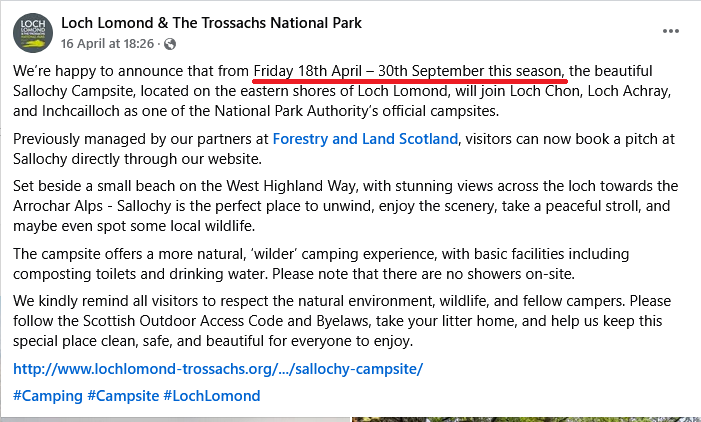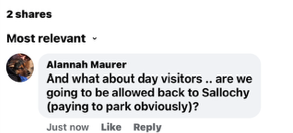
On 16th April the Loch Lomond and Trossachs National Park Authority (LLTNPA) announced on Facebook (there is nothing on its “news” pages) that it had taken over the management of the campsite at Sallochy from Forest and Land Scotland which had threatened to close it (see here). The campsite has played a crucial role in enabling backpackers to walk the West Highland Way following the imposition of the camping byelaws which made informal camping a criminal offence along most of the shore of Loch Lomond between Balmaha and Rowardennan. The LLTNPA has offered no apology for the lack of facilities between the start of the camping byelaw “season” on 1st March and the 18th April.
The LLTNPA’s news piece also failed to mention that they have increased the fees for camping at Sallochy and the other campsites they manage at Loch Chon, Loch Achray and Inchcailloch from £10.00 to £10.80 per an adult. Until three years ago (see here) it cost £5.00 to camp at Inchailloch and £7 to camp at the other three campsites so fees have risen by 50% or more in three years.
 The LLTNPA’s takeover of the FLS campsite offered the opportunity for them to open up access again to day visitors by removing the locked gates which have prevented access to the car park for the last four years. The LLTNPA responded to this question with the usual parkspeak including reference to “affordable” camping:
The LLTNPA’s takeover of the FLS campsite offered the opportunity for them to open up access again to day visitors by removing the locked gates which have prevented access to the car park for the last four years. The LLTNPA responded to this question with the usual parkspeak including reference to “affordable” camping:

In other words, the LLTNPA intends to continue to deny access to day visitors at Sallochy. They have made no attempt to justify this except this is how they manage their other informal campsites. Chuck Gordon’s response is spot on and the LLTNPA’s ban on day visitors parking a Loch Chon – which used to be a public car park – is equally unjustified.
Judging by the other responses on the LLTNPA’s Facebook page lots of people are now disgusted with this apology for a “National Park” (see here):

The ban on day visitors prevents those who are unable to walk far from enjoying Sallochy and makes access to the forest trails above Sallochy much more difficult. Walk Highland puts it succinctly in their description of that walk (see here):
“Sallochy Forestry and Land Scotland car park, east Loch Lomond; this is now closed in summer (1st March – 31st October). There is no public transport, so in summer months you would either need to be staying on the campsite, or using the car parks at either Rowardennan or Balmaha and using the West Highland Way to reach the start”.
How long now until Forest and Land Scotland cease maintaining these forest trails on the grounds that no-one uses them any more?
While the continued ban on parking at Sallochy subverts the access rights of all and makes it much harder to enjoy the shores of east Loch Lomond it is also highly discriminatory, making it almost impossible for those who are old and frail or have a range of disabilities from enjoying a large part of the area. There is now a very strong case for legal action against this “National Park” for actively undermining its statutory duty to promote public enjoyment of the countryside but a mass protest might be easier and cheaper to organise.
The origins of the LLTNPA’s attack on the rights of day visitors go back to one of its justifications for the camping byelaws. Informal camping, it was claimed, infringed the rights of day visitors to enjoy the loch shores. The evidence of the visitor data the LLTNPA had collected at the time, which showed significant numbers of day visitors in the most popular places for camping, was completely ignored. Contrary to what the LLTNPA, different types of visitor quite happily share the same space – in fact that was the assumption behind access rights, which apply to Sallochy, that people should be able to enjoy the countryside through a wide range of different activities, 24 hours a day.

The LLTNPA’s position has never been compatible with access rights but their false presumption that day visitors and campers should be kept apart at all time explains the locked barriers to day visitors at Loch Chon and Sallochy. It also explains why so many of the camping permit areas are on bits of land that few people would otherwise ever visit.
The starting point for the LLTNPA’s review of the camping byelaws, which is now well behind schedule, should be that if neither they or FLS are able to provide places for people to camp from 1st March, as they promised Scottish Ministers, and if they cannot manage camping permit areas so that these can be shared with other people, they should just be scrapped. That would save a huge amount of time being wasted on consultation and on the LLTNPA cherry picking and manipulating data and information to justify their continued existence.

They are also now demanding official photo ID to register a boat on Loch Lomond, which is checked against some sort of official database. They claim it is then deleted which makes no sense as the “problem” it is supposed to solve is people using boats who are not the person named against the registration number.
Clearly the intention is at some point to demand that boaters “show your papers” when using the loch.
At least from those comments people are realising that the objective is fewer, richer visitors.
I can’t see how access rights equate to access by car. Far better for people to access the area by bike or on foot. And this does not automatically discriminate against the elderly and disabled. Many elderly and disabled people are both keen cyclists and walkers. It depends on the individual.
It absolutely does limit access to half the distance from home that the person can walk or cycle in a day, carrying a tent and camping gear, unless the option is some sort of “glamping” facility. Once again, reducing numbers in favour of the rich visitor. In poor weather, albsolutely miserable.
In fact the access legislation originally was to include reasonable access by vehicle but it was opposed by the far left.
At the risk of stating the blindly obvious, surely Day Visitors are there during the day and Camping Visitors are overnight. If Camping Visitors stay a day or two, then they are both types of visitors.
Surely they are eminently compatible?
National Parks are being opposed. https://www.bbc.co.uk/news/uk-scotland-south-scotland-67681886
Note the wording used by the LLTNP in their Facebook announcement on 16 April: “Please follow the Scottish Outdoor Access Code and Byelaws, take your litter home ……”, This is a deliberate misrepresentation by the LLTNP of the access rights secured by the Land Reform (Scotland) Act 2003. When referring to SOAC there should be no additional “and Byelaws” as this gives the incorrect impression that everything in SOAC is backed up by the criminal sanctions contained within byelaws.
The LLTNP antipathy towards this legislation is long standing. When I was involved, as Director of Ramblers Scotland, in negotiations regarding the implementation of this Act the comment that gave me the greatest concern was “the 2003 Act is not worth the paper it is written on”. It was clear that this was the attitude held by senior staff in the LLTNP because they felt that the Act should have contained much more powers for public bodies like themselves to regulate where members of the public should be allowed to go, what activities they were permitted to engage in and, if they did not comply, be subject to sanctions under the criminal law. This was completely incompatible with the principles of right to roam as established by the Scottish Parliament. Nevertheless, the Act did include, as a last resort measure, the opportunity to make bylaws to regulate public access where all other voluntary and advisory measures have failed. During the last 10 years the LLTNP have misused those powers to promote the widespread use of camping byelaws and applied repeated pressure on politicians to secure powers for them to issue on the spot fines against people who do things which the LLTNP does not approve of. They are well on the way to turning the ranger service in the national park into a quasi-police force in which the public will have no confidence. This needs to be an issue in the forthcoming elections to the Scottish Parliament. We need politicians who understand the damage being done by the LLTNP to public interests in this national park and for the next parliament to take corrective action.
If they get away with the ID requirements for boaters (and no one seems to care) expect the same to be introduced for land visitors. Soon you will have to apply in advance (with ID) for a short term Visitor Permit which will be limited in number, cost a significant sum and be required to be shown on demand while in the park. Permit numbers will be reduced year on year and the price increased “to protect the environment”.